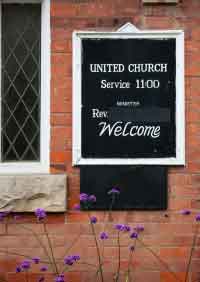 I came across a new tag this week that partly describes my theological position. Whenever someone discovers I am a minister of the gospel, they always ask, “What church are you with?” By that they really mean, “Which denomination?” As my good friend Norman Campbell says about tags, “If you go up they fall off, and if you go down they burn off!” That’s a good way to say that denominational tags (and other kinds like theological) are not the least bit important in God’s sight.
I came across a new tag this week that partly describes my theological position. Whenever someone discovers I am a minister of the gospel, they always ask, “What church are you with?” By that they really mean, “Which denomination?” As my good friend Norman Campbell says about tags, “If you go up they fall off, and if you go down they burn off!” That’s a good way to say that denominational tags (and other kinds like theological) are not the least bit important in God’s sight.
I was born into a Christian family (Salvation Army, the founder was a holiness Wesleyan evangelist) and we went to the Army five times on Sunday and two or three nights each week. “Mary had a little lamb, it would have been a sheep. But it joined our local church, and died from lack of sleep.” Then after my mother died when I was 19, I started visiting other churches and became a Nazarene (Church of the Nazarene, also a holiness Wesleyan church, where I met my wife Vivien).
Later, as a result of listening to Oral Roberts’ radio broadcasts and reading many books, Vivien and I were led to train for the Full Gospel ministry and we went to Life Bible College in Perth, Western Australia (now moved to Sydney, New South Wales), and became Pentecostals, members of a Foursquare church (International Church of the Foursquare Gospel, a Pentecostal partly-Reformed tradition church). A few years later after becoming Foursquare ministers, we switched our church and ourselves as ministers to the Assemblies of God denomination (another Pentecostal partly-Reformed tradition church), and then finally became non-denominational and trans-denominational and non-Wesleyan. And that’s just some of the “tags” we have worn over the years.
The new descriptive tag I found on Wikipedia while doing some research for a second edition of my book on the Holy Spirit field. It is this: Finished Work Pentecostals. That partly explains where I’m coming from, though the Pentecostals don’t want to know me anymore since I take the Finished Work of Christ to its logical completeness. Apparently the Finished Work Controversy split the US Pentecostal movement in the first decade after the Azusa Street outpouring in 1906. Most new Pentecostal denominations founded after about 1911 followed the Reformed heritage of seeing sanctification as occuring at salvation, while the Wesleyans see it as a second work of grace after salvation. The major exception was and is the Church of God in Christ, an African-American denomination formed in 1897 in the South and which later embraced the Azusa Street revival in Los Angeles and quickly became the leading tongues-speaking denomination. It is still the largest Pentecostal denomination in the US with an estimated 5 million members and 12,000 churches. The predominantly white Assemblies of God split off from COGIC in 1914.
But enough of history. The Word is clear that the Father does not want multiple “tribes” in His New Testament church. In His nation of Israel in Old Testament times, only men from the tribe of Levi could be priests. To the Corinthians Paul wrote: “I appeal to you, brothers, by the name of our Lord Jesus Christ, that all of you agree, and that there be no divisions among you, but that you be united in the same mind and the same judgment” (I Cor. 1:10 ESV). “What I mean is that each one of you says, ‘I follow Paul,’ or ‘I follow Apollos,’ or ‘I follow Cephas,’ or ‘I follow Christ’. Is Christ divided? Was Paul crucified for you? Or were you baptized in the name of Paul?” (1:12-13 ESV). “For while one saith, I am of Paul; and another, I am of Apollos; are ye not carnal “No divisions” means there is no need to take notice of tags. I doubt that the Christian church will ever become one again but it is time we took more notice of the Word of God rather than the word of man or men united around a common belief. I hope I can get along with anyone who is a Christian and loves the Word of God, but I can only get along with those who want to get along with me, so there is a limitation! We need to look past the tag and see the Christ in the individual — that is the only unchanging truth in a changing world.



Leave A Comment